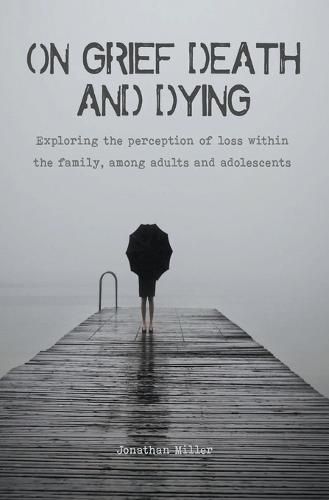Readings Newsletter
Become a Readings Member to make your shopping experience even easier.
Sign in or sign up for free!
You’re not far away from qualifying for FREE standard shipping within Australia
You’ve qualified for FREE standard shipping within Australia
The cart is loading…






This title is printed to order. This book may have been self-published. If so, we cannot guarantee the quality of the content. In the main most books will have gone through the editing process however some may not. We therefore suggest that you be aware of this before ordering this book. If in doubt check either the author or publisher’s details as we are unable to accept any returns unless they are faulty. Please contact us if you have any questions.
Grief is a journey one can only take alone. There is no rehearsal for it, no primer courses. It cannot be measured or timed. No one can do it with you or for you. There is never an end, completion, finish line. There is no one prescribed way to do it, nor is there a tidy process. Grief is messy.
Most importantly, grief is something that no one ever escapes. It surrounds us all the time. It is layered in our lives, permeates the atmosphere.
It is ubiquitous. There are many types and degrees of grief; there are deep pockets of anguish and intense grief that follow a significant person's death in our lives. The more important the relationship, the lower the grieving. In greater and lesser degrees, grief is a continuous process that we navigate throughout our lives.
Grief is about loss, and we are all experiencing losses, major or minor, consistently. For the more enlightened of us, the knowledge of our own mortality can be a constant source of grief that percolates just beyond our daily thought processes. So, if grief is unavoidable and pervasive, why is it such a taboo subject? Why is it totally ignored, shunned, and hidden? Can it be that grief-in our childish, self-absorbed, desperately competitive culture-seems too much like losing and, therefore, must be refuted? In our death-denying American culture, is grief too much a reminder of death, and therefore like death itself, must it be denied at all costs? The grief that lies at the core of so many of our many problems and inabilities to grapple with daily life goes unexamined by even the people who are trained, in theory, to help us navigate through the accumulated traumas of life.
$9.00 standard shipping within Australia
FREE standard shipping within Australia for orders over $100.00
Express & International shipping calculated at checkout
This title is printed to order. This book may have been self-published. If so, we cannot guarantee the quality of the content. In the main most books will have gone through the editing process however some may not. We therefore suggest that you be aware of this before ordering this book. If in doubt check either the author or publisher’s details as we are unable to accept any returns unless they are faulty. Please contact us if you have any questions.
Grief is a journey one can only take alone. There is no rehearsal for it, no primer courses. It cannot be measured or timed. No one can do it with you or for you. There is never an end, completion, finish line. There is no one prescribed way to do it, nor is there a tidy process. Grief is messy.
Most importantly, grief is something that no one ever escapes. It surrounds us all the time. It is layered in our lives, permeates the atmosphere.
It is ubiquitous. There are many types and degrees of grief; there are deep pockets of anguish and intense grief that follow a significant person's death in our lives. The more important the relationship, the lower the grieving. In greater and lesser degrees, grief is a continuous process that we navigate throughout our lives.
Grief is about loss, and we are all experiencing losses, major or minor, consistently. For the more enlightened of us, the knowledge of our own mortality can be a constant source of grief that percolates just beyond our daily thought processes. So, if grief is unavoidable and pervasive, why is it such a taboo subject? Why is it totally ignored, shunned, and hidden? Can it be that grief-in our childish, self-absorbed, desperately competitive culture-seems too much like losing and, therefore, must be refuted? In our death-denying American culture, is grief too much a reminder of death, and therefore like death itself, must it be denied at all costs? The grief that lies at the core of so many of our many problems and inabilities to grapple with daily life goes unexamined by even the people who are trained, in theory, to help us navigate through the accumulated traumas of life.